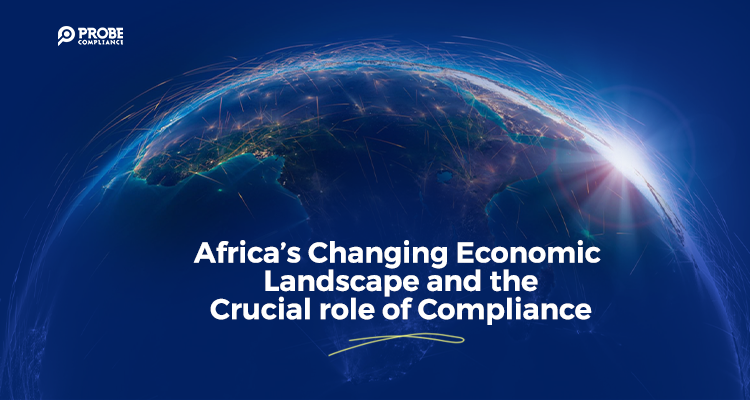
Africa’s economic landscape is undergoing a significant transformation, driven by rapid urbanization, a burgeoning middle class, and increasing digital connectivity. With a young and dynamic population, the continent is poised to become a global economic powerhouse. However, alongside these promising developments, the need for robust compliance frameworks has never been more critical.
The Changing Economic Landscape
- Economic Growth: Over the past decade, several African nations have experienced substantial economic growth. Countries like Nigeria, South Africa, Kenya, and Ghana are becoming important players in the global economy, attracting foreign investment and fostering entrepreneurial ecosystems.
- Diversification: Historically reliant on commodities, many African economies are now diversifying. There is a notable shift towards sectors like technology, agriculture, manufacturing, and services. This diversification is crucial for sustainable development and resilience against global economic shocks.
- Digital Revolution: The digital revolution is transforming Africa. Mobile technology has leapfrogged traditional infrastructure, providing millions with access to financial services, healthcare, and education. Innovations such as mobile money platforms (e.g., M-Pesa) are driving financial inclusion and economic participation.
- Infrastructure Development: Significant investments in infrastructure, including transportation, energy, and telecommunications, are catalyzing economic activities and regional integration. Projects like the African Continental Free Trade Area (AfCFTA) aim to create a single market, boosting intra-African trade.
The Crucial Role of Compliance
As Africa’s economies evolve, the importance of compliance in ensuring sustainable growth and development cannot be overstated. Compliance encompasses adherence to laws, regulations, and standards designed to maintain fair, transparent, and accountable practices. Here’s why it is crucial:
- Attracting Investment: Robust compliance frameworks instill confidence in investors, both domestic and international. They ensure that business practices align with global standards, reducing the risk of corruption and fostering a stable investment climate.
- Enhancing Corporate Governance: Effective compliance mechanisms promote transparency and accountability within organizations. This leads to better decision-making, risk management, and long-term sustainability.
- Protecting Stakeholders: Compliance safeguards the interests of various stakeholders, including customers, employees, and shareholders. It ensures that companies operate ethically and responsibly, enhancing their reputation and trustworthiness.
- Legal and Financial Stability: Adherence to regulatory requirements mitigates the risk of legal penalties and financial losses. It also ensures that businesses can navigate the complex legal landscapes across different African countries.
The Future of Compliance in Africa
The future of compliance in Africa is intrinsically linked to the evolution of compliance technology. As economies and regulatory environments become more complex, leveraging technology will be essential for efficient and effective compliance management.
- RegTech Innovations: Regulatory technology (RegTech) is transforming compliance processes through automation, data analytics, and artificial intelligence (AI). These technologies can streamline compliance monitoring, reporting, and enforcement, reducing the burden on businesses and regulators.
- Blockchain Technology: Blockchain offers the potential for transparent and immutable record-keeping. It can enhance the integrity of financial transactions, supply chains, and regulatory reporting, reducing the risks of fraud and non-compliance.
- AI and Machine Learning: AI and machine learning algorithms can analyze vast amounts of data to detect patterns and anomalies, identifying potential compliance issues before they escalate. Predictive analytics can also help in anticipating regulatory changes and preparing accordingly.
- Digital Identity Verification: Ensuring the authenticity of individuals and entities is crucial for compliance. Digital identity verification technologies can enhance Know Your Customer (KYC) and Anti-Money Laundering (AML) processes, making them more efficient and reliable.
- Integrated Compliance Platforms: Future compliance will likely see the rise of integrated platforms that consolidate various compliance functions into a single interface. These platforms will offer real-time insights, facilitate cross-border compliance, and adapt to evolving regulations seamlessly.
Conclusion
Africa’s economic transformation presents immense opportunities but also necessitates a robust compliance framework to ensure sustainable and inclusive growth. Embracing compliance technology will be key to navigating the complexities of the evolving regulatory landscape. By fostering a culture of compliance and leveraging technological advancements, Africa can build a resilient and transparent economic environment that attracts investment, protects stakeholders, and promotes long-term prosperity.
For organizations navigating this evolving landscape, partnering with experts like Probe Compliance Africa can make all the difference. Whether you need assistance with regulatory adherence, corporate governance, or leveraging the latest compliance technologies, Probe Compliance Africa is here to meet all your compliance needs. Contact us today to learn how we can support your journey towards sustainable growth and success.
